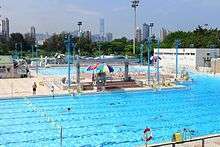Kowloon Tsai Swimming Pool
| Kowloon Tsai Swimming Pool | |
|---|---|
 Swimming pool | |
| Address | No. 13 Inverness Road, Kowloon |
| Opened | 5 June 1964 |
| Operator | Leisure and Cultural Services Department |
| Type | Open air |
| Cost | HK$3.5 million |
| Website | Official website |
| Sponsor | Royal Hong Kong Jockey Club |
The Kowloon Tsai Swimming Pool (Chinese: 九龍仔游泳池) was the first public swimming pool complex in Kowloon, Hong Kong. Since the old Victoria Park Swimming Pool was demolished in 2014, it stands as the oldest existing public swimming pool in Hong Kong.
The pool complex is located in Kowloon Tsai Park and comprises a main 50 metre pool, a leisure pool, and a children's pool.
History
It was decided in 1958 to build a swimming pool in Kowloon.[1] On 5 January 1960 the chairman of the Urban Council announced that a swimming pool would be built at Kowloon Tsai, on an area of land levelled to provide a safer approach for aircraft approaching the new runway at Kai Tak Airport.[2]
The pool's construction cost about $3.5 million, of which more than $2 million was contributed by the Royal Hong Kong Jockey Club.[3][1] Works began on 30 March 1962 by contractors Hung Yue and Co.[4] The pool's opening date was delayed by slow construction.[1][5] The complex was finally opened on 5 June 1964 by Governor David Trench and Lady Trench.[6] The Urban Council invited 2,000 children to attend the ceremony.[7] Sir David unveiled a memorial plaque at the pool's entrance and fired a pistol to start the first school swimming race held there.[6]
Kowloon Tsai Swimming Pool was the first public swimming pool in Kowloon, and patronage in the first 30 days of operation averaged 4,784 people per day, well exceeding use of the territory's only other existing pool at Victoria Park.[8] It is located in Kowloon Tsai Park, the first phase of which also opened in 1964. The opening of the pool was publicised internationally in a British Pathé newsreel, which stated a construction cost of £125,000 and highlighted the lack of bathing beaches in the densely populated vicinity.[9] The pools are surrounded by various one-storey buildings housing changing rooms and offices. The pool water was originally supplied by a well sunk under the park specifically for this purpose.[10]
Originally, the pool closed at 4:00 pm because it sat under the airport flight path, hence the Civil Aviation Department would not agree on the use of outdoor floodlighting there.[11]
Planned demolition
The government plans to demolish the pool and replace it with a new complex with indoor and outdoor pools. The Architectural Services Department invited private architectural firms to bid on the project in late 2015.[12]
References
- 1 2 3 "Delay of swimming pool". South China Morning Post. 4 July 1962. p. 6.
- ↑ "Kowloon Tsai Swimming pool". South China Morning Post. 6 January 1960. p. 7.
- ↑ "Big swimming pool planned in Kowloon Tsai Park". South China Morning Post. 7 January 1961. p. 7.
- ↑ "Swimming Pool Being Constructed In Kowloon Tsai". South China Morning Post. 28 April 1962. p. 9.
- ↑ "Construction Of Pool 'Slow'". South China Morning Post. 7 November 1962. p. 6.
- 1 2 "Plans for improved amenities". South China Morning Post. 6 June 1964. p. 6.
- ↑ "Opening Of Swimming Pool". South China Morning Post. 4 June 1964. p. 8.
- ↑ "More New Recreation Facilities". South China Morning Post. 8 July 1964. p. 6.
- ↑ "Hong Kong's In The Swim" (Film). British Pathé. Retrieved 1 May 2014.
- ↑ "Big Swimming Pool For Kowloon". South China Morning Post. 26 May 1964. p. 5.
- ↑ Ip, Ki-Tit (21 July 1979). "Shedding light on Kowloon Tsai pool". South China Morning Post.
- ↑ "Notice of Invitation for Expression of Interest - Redevelopment of Kowloon Tsai Swimming Pool" (PDF). Architectural Services Department. 27 November 2015.
External links
| Wikimedia Commons has media related to Kowloon Tsai Swimming Pool. |
Coordinates: 22°20′00″N 114°11′04″E / 22.3332°N 114.1845°E